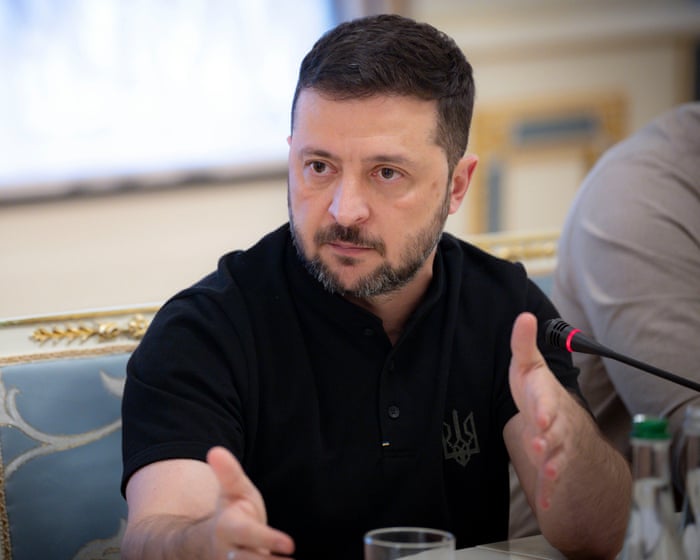Ukrainian President Volodymyr Zelenskyy plans to urge Donald Trump to impose sanctions on Russia when they meet next week at the United Nations in New York. He has also called on Ukraine’s allies to “stop wasting time.”
Zelenskyy stated that he expects further sanctions if Vladimir Putin refuses to meet for direct talks or agree to a ceasefire. “If the war continues and there are no moves toward peace, we expect sanctions,” he said.
Trump has repeatedly threatened action against Russia but has not yet followed through. Last week, he said the U.S. is ready to impose “major sanctions”—but only after all NATO countries agree to stop buying Russian oil and to place tariffs on China, another major importer.
Speaking to journalists in Kyiv, including from The Guardian, Zelenskyy expressed frustration with the slow pace of events. He argued that linking possible U.S. sanctions to demands that European countries act first only “slows down the pressure on Putin.”
“President Trump expects strong action from Europe. I think we are wasting a lot of time if sanctions are not imposed or other steps are not taken, which we very much expect from him,” Zelenskyy said from his presidential office.
On Saturday, Ukraine reported that Russia launched more than 600 drones and missiles at the country.
Trump’s close allies Hungary and Slovakia have refused to cut energy ties with Moscow. They are the last two EU members still buying Russian oil via the Druzhba pipeline. Ukraine bombed the pipeline last month, prompting an angry response from Hungarian Prime Minister Viktor Orbán.
Zelenskyy said he wants “the whole of Europe” to impose sanctions. He believes Trump could “push” European countries to do more, adding that Slovakia’s pro-Russian government would likely respond to American pressure. “Everyone is looking to the United States,” he noted.
He reiterated his willingness to meet Putin in any format—one-on-one or with the U.S. president present. The Kremlin insists that the “root causes” of the conflict must be addressed first, referring to Ukraine’s surrender.
During his New York trip, Zelenskyy will also seek clarity on what security guarantees the U.S. is willing to provide as part of a peace deal. He mentioned that British Prime Minister Keir Starmer raised this issue with Trump during the president’s state visit to the UK and in their recent talks at Chequers.
Zelenskyy said his wife, Olena, will “most likely” meet Melania Trump in New York to discuss the return of Ukrainian children taken by Russia. The U.S. first lady is seen as more sympathetic to Kyiv than the president, who criticized Zelenskyy during their February meeting in the Oval Office.
Their last White House meeting in August went more smoothly, with several European leaders, including Starmer, joining the talks. Next week’s meeting takes place amid provocative Russian actions in Europe, including three Russian fighter jets violating Estonian airspace on Friday.
Zelenskyy also noted that Ukraine is using more long-range drones to target Russian energy facilities that supply its military. Early Saturday, drones hit the Saratov oil refinery for the second time in a week, with video showing explosions and flames. Another strike damaged a refinery in Samara.
He predicted that Russia’s fuel crisis, which has caused long petrol queues in some areas, will worsen. While Ukraine is narrowing the gap with Russia in drone production, Zelenskyy emphasized the need for more funding to support domestic weapons manufacturing.
Overnight, Russia carried out a large-scale attack.Russia launched a large-scale drone and ballistic missile attack on Ukraine. A missile carrying cluster munitions hit an apartment building in the city of Dnipro, killing at least three people. Officials reported that other regions, including Mykolaiv, Chernihiv, and Zaporizhzhia, were also targeted.
In a social media post, President Zelenskyy stated that the Kremlin is not targeting military sites but is instead carrying out a deliberate strategy to terrorize civilians and damage infrastructure.
He called for a strong international response, urging Europe to strengthen Ukraine’s air defenses and increase weapons supplies.
Frequently Asked Questions
Of course Here is a list of FAQs about the topic designed to be clear and helpful for a range of readers
General Beginner Questions
Q Who is Zelenskyy and what is he referring to
A Volodymyr Zelenskyy is the President of Ukraine Hes referring to the slow pace of military aid and political support from allied countries in Ukraines war against Russia
Q Why did he say allies are wasting time
A He believes that delays in delivering weapons money and political decisions are costing Ukrainian lives and giving Russia an advantage on the battlefield Every day of delay allows Russia to strengthen its defenses
Q Who is he meeting with and why is it a big deal
A He is preparing to meet with Donald Trump This is a big deal because Trump is the likely Republican nominee for US President A future President Trump could drastically change the level of US support for Ukraine as he has been critical of ongoing aid
Q What does Ukraine want from its allies
A Primarily they want more advanced weapons financial assistance to keep the government running and a clear longterm commitment to their security
Advanced Detailed Questions
Q What specific examples of wasting time has Zelenskyy pointed to
A He has often cited the long delays in approving aid packages in the US Congress and the slow delivery of promised weapons systems like F16 fighter jets and ATACMS missiles which were debated for months before finally being sent
Q How could a meeting with Donald Trump impact US policy
A The meeting is seen as an attempt by Zelenskyy to directly persuade a potential future president to continue supporting Ukraine If Trump is convinced he might continue aid if elected If not US support could be significantly reduced or withdrawn
Q What are the main arguments from those who want to slow down or stop aid to Ukraine
A Critics argue that the war is too costly for US taxpayers that the funds should be spent on domestic issues that the conflict could escalate into a wider war with Russia and that there is no clear path to a Ukrainian victory



